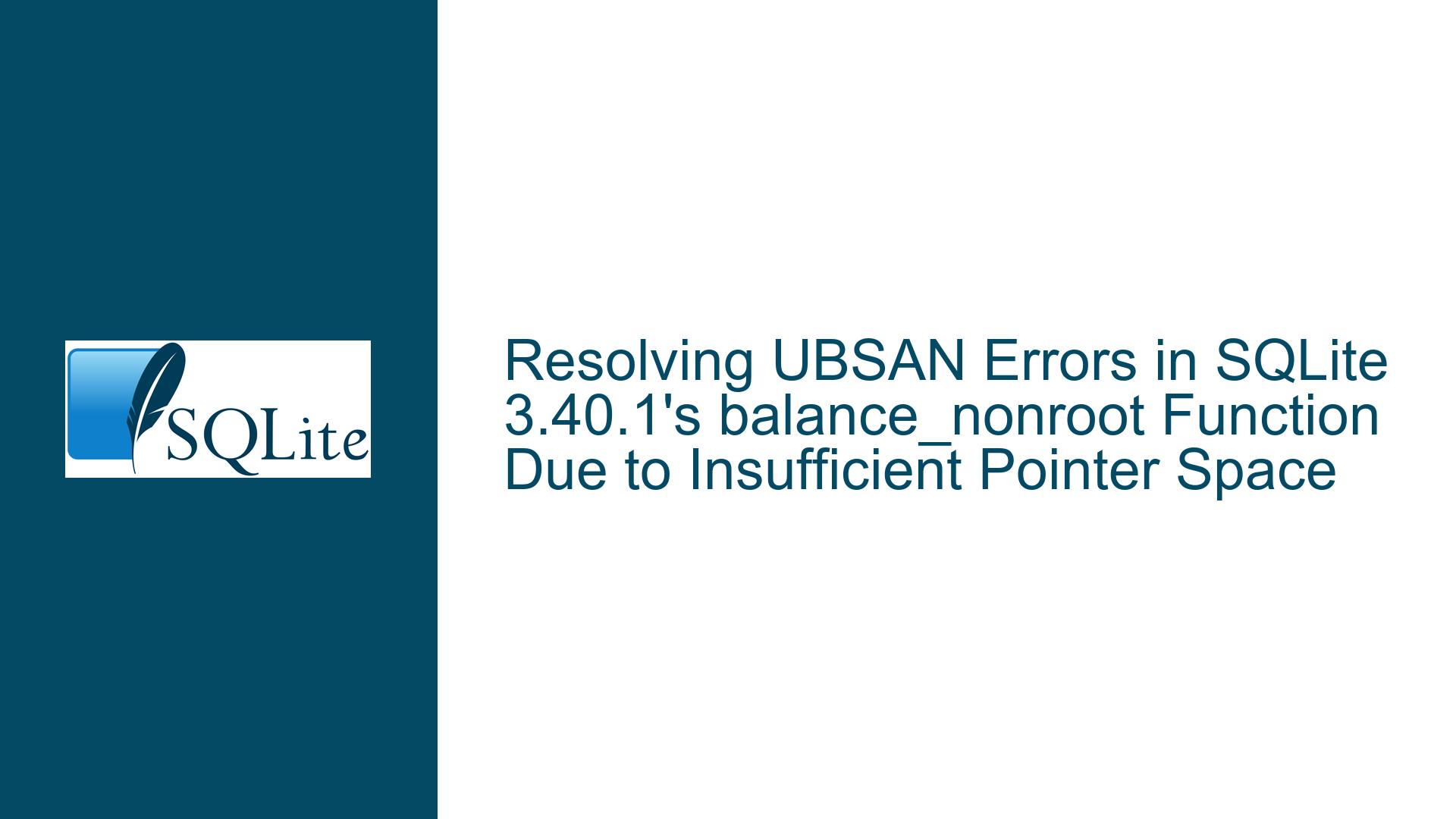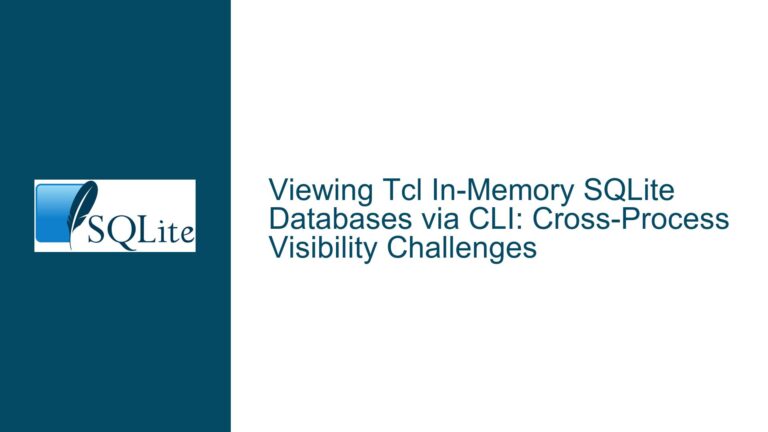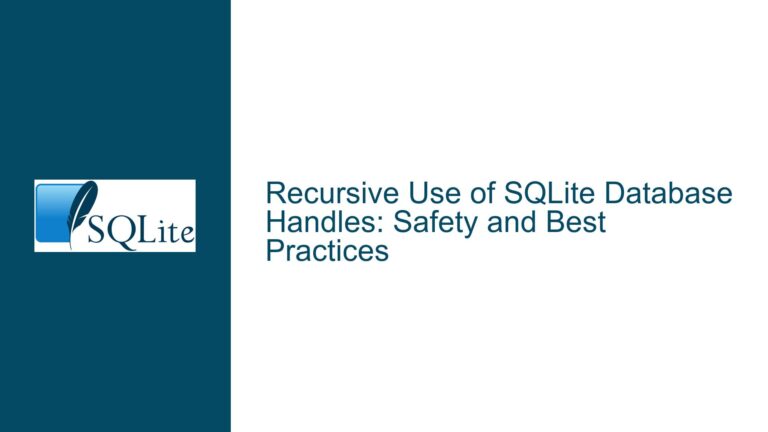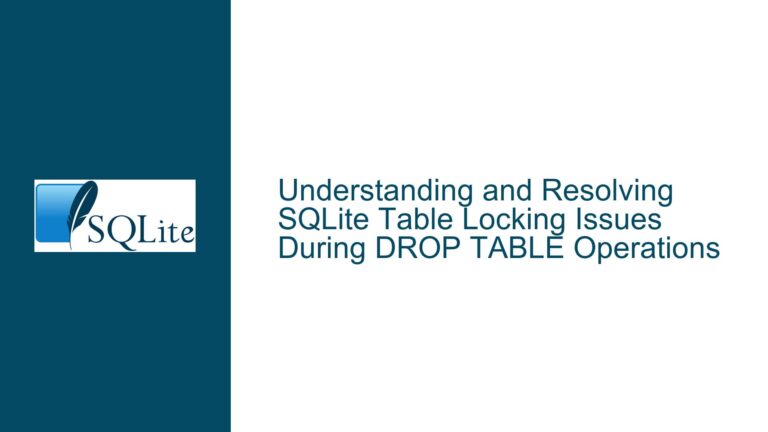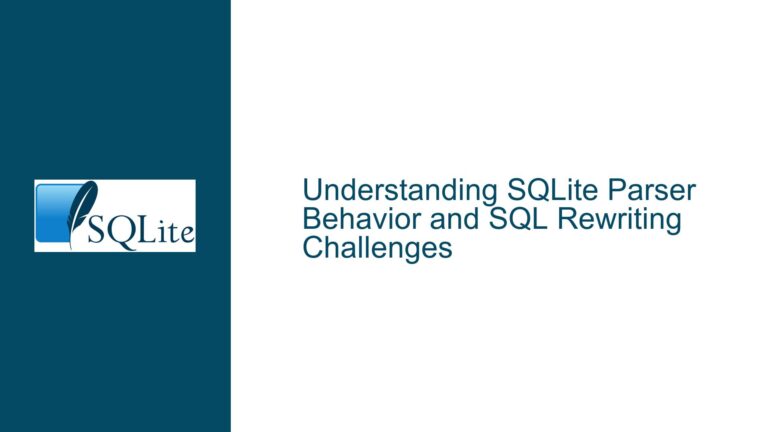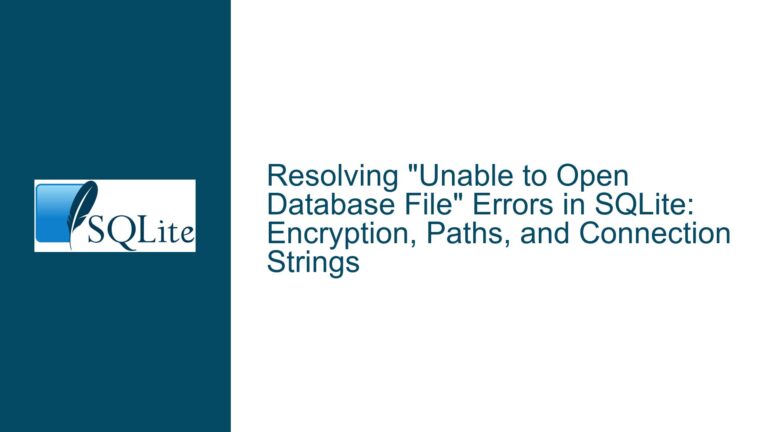Resolving UBSAN Errors in SQLite 3.40.1’s balance_nonroot Function Due to Insufficient Pointer Space
UBSAN Runtime Error: Pointer Access with Insufficient Memory Allocation in balance_nonroot
Root Cause: Misaligned or Under-Allocated Pointer Access in B-Tree Balancing Logic
The core issue arises from the Undefined Behavior Sanitizer (UBSAN) detecting a pointer dereference operation in SQLite’s balance_nonroot function (line 76514 of sqlite3.c) where the memory region referenced does not have sufficient space to hold a struct MemPage* object. This occurs during B-tree operations, specifically when SQLite attempts to rebalance a non-root page. The error manifests as:
runtime error: load of address 0x7ffe5f1969d0 with insufficient space for an object of type 'struct MemPage *'
UBSAN flags this because the pointer’s target address does not meet the alignment or size requirements for the MemPage structure. This is critical because MemPage is central to SQLite’s page cache management, representing an in-memory copy of a database page.
The error occurs during the execution of the fuzzcheck test suite, which simulates extreme or malformed database states to validate SQLite’s robustness. The balance_nonroot function is part of SQLite’s B-tree balancing algorithm, which ensures that database pages remain optimally structured for read/write efficiency. When splitting or merging pages during insert/delete operations, SQLite temporarily stores pointers to child pages in a stack-allocated array. The UBSAN error suggests that one of these pointers references a memory region smaller than the MemPage structure’s actual size, violating strict aliasing rules or alignment constraints enforced by GCC 13’s UBSAN.
Key technical factors:
- Stack Allocation Limits: The
balance_nonrootfunction uses a fixed-size array (apOld) ofMemPage*pointers, declared asMemPage *apOld[NB](whereNBis a constant). If the stack frame’s alignment or the array’s memory footprint is miscalculated, accessing elements beyond the array’s bounds could reference invalid regions. - Compiler-Specific Behavior: GCC 13 introduces enhanced object size tracking in UBSAN, which may interpret certain pointer arithmetic or type casts as undefined behavior where older compilers did not.
- Fuzz Test Edge Cases: The
fuzzdata*.dbfiles used in testing may trigger rare B-tree configurations where the number of child pages exceeds expectations, leading to out-of-bounds array accesses.
Potential Triggers: Alignment Violations, Stack Corruption, and Compiler Optimizations
Incorrect Pointer Casting or Aliasing
TheapOldarray inbalance_nonrootmight be populated with pointers derived from improperly aligned sources. For example, if avoid*orchar*buffer is cast toMemPage*without ensuring proper alignment, UBSAN detects the mismatch between the pointer’s declared type and its actual memory region.Stack Frame Overflow
Thebalance_nonrootfunction’s stack-allocated variables (includingapOld) may exceed the compiler’s expected stack usage, especially ifNBis larger than anticipated. GCC’s stack protection mechanisms or UBSAN’s object size checks could flag this as an overflow.GCC 13’s Stricter UBSAN Checks
Newer versions of UBSAN in GCC 13 enforce stricter validation of pointer-to-object mappings. For example, if a pointer is incremented beyond the bounds of its originally allocated object (even within the same stack frame), UBSAN may raise false positives. This is particularly relevant in code that uses pointer arithmetic to navigate struct fields or arrays.Memory Corruption During B-Tree Operations
During page balancing, SQLite manipulates complex linked structures ofMemPageobjects. If a prior operation (e.g., page splitting) corrupts theMemPagemetadata, subsequent accesses to the corrupted page could reference invalid memory.Undefined Behavior in Dependent Functions
The call stack traces implicate functions likesqlite3BtreeInsertandsqlite3VdbeExec, which manage database transactions and virtual machine operations. If these functions pass malformedMemPagepointers tobalance_nonroot, the error propagates downstream.
Resolution Strategy: Code Analysis, Compiler Workarounds, and Validation
Step 1: Isolate the Faulty Pointer Access in balance_nonroot
Begin by inspecting the balance_nonroot function’s code around line 76514. The error log points to a line where a MemPage* is dereferenced. For example:
MemPage *pParent = apOld[0]->pParent;
If apOld[0] is an invalid pointer, this line triggers the UBSAN error.
Action Items:
- Verify that all elements of the
apOldarray are initialized correctly before being dereferenced. - Check for off-by-one errors in loops that populate
apOld, ensuring indices do not exceedNB. - Use debug prints or assertions to validate the integrity of
apOldentries during test execution.
Step 2: Enforce Proper Alignment for Stack-Allocated Arrays
If apOld is declared as a stack-allocated array, ensure it is aligned to the requirements of MemPage*. GCC’s __attribute__((aligned)) can enforce this:
MemPage *apOld[NB] __attribute__((aligned(16)));
This guarantees that the array’s memory meets the alignment constraints of the MemPage structure, avoiding UBSAN’s alignment checks.
Step 3: Adjust Stack Usage to Prevent Overflows
If the stack frame for balance_nonroot is too small, increase the compiler’s stack size limit using -Wstack-usage= or refactor the code to use heap allocation for large arrays. For example, replace:
MemPage *apOld[NB];
with:
MemPage **apOld = sqlite3_malloc(NB * sizeof(MemPage*));
Ensure proper error handling and deallocation to prevent memory leaks.
Step 4: Suppress UBSAN Checks for Specific Functions (Temporary Workaround)
If the error persists and is deemed a false positive, selectively disable UBSAN for balance_nonroot using function attributes:
__attribute__((no_sanitize("undefined")))
static void balance_nonroot(...) { ... }
Caution: This should only be a stopgap measure while awaiting a permanent fix.
Step 5: Patch SQLite’s B-Tree Logic to Validate Pointers
Modify balance_nonroot to include sanity checks before dereferencing MemPage* pointers:
assert(apOld[i] != NULL);
assert(sqlite3PageIsValid(apOld[i])); // Hypothetical helper function
Implement a function like sqlite3PageIsValid to verify that the pointer references a properly allocated MemPage structure.
Step 6: Collaborate with SQLite Developers for Upstream Fixes
Submit a detailed bug report to SQLite’s official repository, including:
- A minimal reproducible test case using the
fuzzcheckdata. - Disassembly or IR output showing the problematic pointer access.
- Proposed patches based on Steps 1–5.
Step 7: Validate with Alternate Compilers and Sanitizers
Test the same SQLite build with Clang’s UBSAN and ASAN to determine if the issue is GCC-specific. If Clang does not report the error, investigate GCC 13’s interpretation of the code versus Clang’s.
Step 8: Backport Fixes from SQLite’s Development Branch
Check SQLite’s public version control system (e.g., Fossil repo) for recent commits addressing UBSAN warnings or B-tree balancing logic. If a fix exists in a newer version, backport it to 3.40.1.
Long-Term Solutions and Best Practices
Adopt Defensive Programming in Low-Level Database Code
- Use
static_assertto validate struct alignment and size during compilation. - Replace raw pointer arrays with type-safe containers that enforce bounds checking.
- Use
Continuous Integration with Advanced Sanitizers
Integrate UBSAN, ASAN, and TSAN into SQLite’s CI pipeline to catch undefined behavior early. Configure GCC 13 as part of the compiler matrix to anticipate future issues.Compiler Flag Tuning for Embedded Systems
When targeting memory-constrained environments, combine-fsanitize=undefinedwith-fno-sanitize-recoverto halt on first error, ensuring strict compliance.Documentation and Community Engagement
Maintain a public log of UBSAN-related fixes to educate developers on SQLite’s memory safety patterns. Encourage contributors to validate changes against multiple sanitizers.
By methodically addressing pointer alignment, stack allocation, and compiler-specific behaviors, developers can resolve the UBSAN errors in balance_nonroot while strengthening SQLite’s resilience against undefined behavior in future releases.
